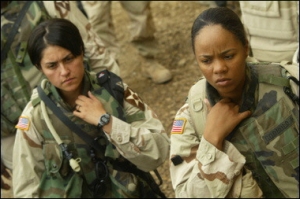 When I think of Black women’s relationship to the military, to war, and to soldier narratives more generally, I’m reminded that our motivations are often times fundamentally different and that our stories, like our lives, are unfairly ephemeral, fading quickly into the background.
When I think of Black women’s relationship to the military, to war, and to soldier narratives more generally, I’m reminded that our motivations are often times fundamentally different and that our stories, like our lives, are unfairly ephemeral, fading quickly into the background.
Black feminism would not be the same without one Black female war hero in particular: General Harriet Tubman. During the Civil War, Tubman planned and executed the only military campaign in U.S. History to be led by a woman. The result of her action at the Combahee River freed 750 slaves. It was Harriet’s heroics at Combahee that led Black feminist activist Barbara Smith to name the venerable Black feminist group of the 1970s the Combahee River Collective. Smith said that the name “was a way of talking about ourselves being on a continuum of Black struggle, of Black women’s struggle.” And without Harriet, without Combahee, without Barbara Smith, a warrior in her own right, there would be no Crunk Feminist Collective, no model of fierce female activism for this generation.
I think, too, of 2003, the year that Shoshana Johnson, became the first Black female prisoner of war for 22 days. She was held captive in Iraq, and upon release, her story was dwarfed by the story of Jessica Lynch a fellow P.O.W., who received a multi-million dollar book deal. Both of these women were heroic, and both women’s stories deserve to be told. Not just Jessica’s. But Jessica challenged soldier narratives because she was an ultra-feminine, dainty, blonde-haired white woman. Her challenge to the dominant masculine narratives of our military are welcome. But like so much of the history of white and Black women and feminism, the Black woman in this scenario was overlooked. Perhaps because America was honest enough to admit that Black women aren’t new to war, aren’t new to prison, aren’t new to violence on behalf of this nation. Perhaps because Shoshana’s dark-skin and Panamian features rendered her distinctly unfeminine and made her labor of love more cursory—obligatory— expected. Whatever the case, Johnson was a recipient of the Purple Heart, Bronze Star and P.O.W. medal. Her memoir I’m Still Standing: From Captive U.S. Soldier to Free Citizen –My Journey Home was released this year by Simon & Schuster.
So on this day, I will remember all the sisters who have fought and are fighting for us to be free. And I am reminded that when Harriet fought, when Shoshana fought, when Ida and Sojourner, and Rosa, and Ella, and Fannie, and Angela fought, they fought for a realer more robust definition of freedom. One that recognized the fundamental humanity of all people, no matter color, gender, religion, sexuality, class or ability. They understood that U.S. does not have a monopoly on freedom or a mandate to take liberties with the livelihood of others. These women are the authors of my freedom songs, and it is them I remember today.
For all those sisters who are literally at war and the families missing them at home, I dedicate to them the new video from Trey Songz (I know, y’all—but as contemporary representations of Black love go, this is one of the better ones). And to every sister fighting for us overseas, on war-torn urban city blocks, and in every place of struggle, I simply wish them: peace.










Recent Comments